Black Panther: Wakanda Forever
 for sequences of strong violence, action and some language.
for sequences of strong violence, action and some language.
Reviewed by: Alexander Malsan
CONTRIBUTOR
| Moral Rating: | Offensive |
| Moviemaking Quality: |
|
| Primary Audience: | Adults Young-Adults Teens |
| Genre: | Superhero Sci-Fi Action Adventure Thriller Sequel |
| Length: | 2 hr. 41 min. |
| Year of Release: | 2022 |
| USA Release: |
November 11, 2022 (wide release) DVD: February 7, 2023 |
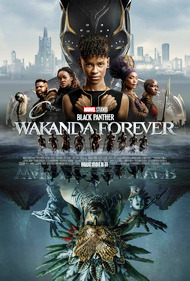

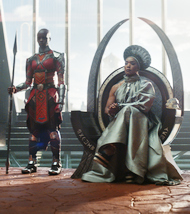

Fictional African kingdom/country
Afrofuturism movement
Paganism / false religion / anti-Christian worldview
Prayer to the Egyptian false god, Bast (aka Bastet)
About idolatry and false gods in the Bible
Death of a loved one and national leader
Dealing with grief
Quest of nations for superior weapons
Hollywood films that characterize the United States and other Western nations as “greedy colonizers”
About mercy in the Bible
What is true Christian love, according to the Bible?
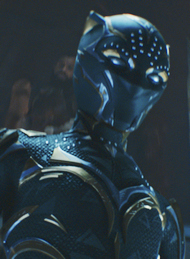
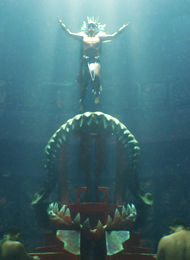
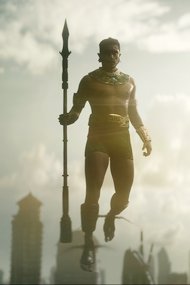

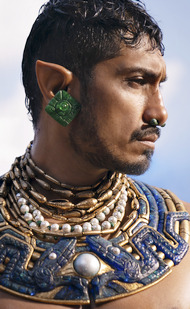
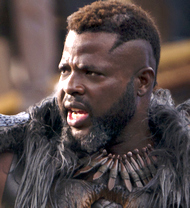
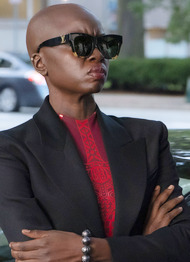
| Featuring |
|---|
|
Angela Bassett … Ramonda Tenoch Huerta … Namor Martin Freeman … Everett K. Ross Danai Gurira … Okoye Lupita Nyong'o … Nakia Letitia Wright … Shuri Michaela Coel … Aneka Richard Schiff … Winston Duke … M’Baku See all » |
| Director |
|
Ryan Coogler |
| Producer |
|
Marvel Studios Walt Disney Pictures See all » |
| Distributor |
Prequel: “Black Panther” (2018)
King T’Challa, the King of Wakanda, has died. T’Challa, the Blank Panther, an Avenger and the protector of the Wakandans, contracted an illness for which there was no cure, despite his brilliant, younger sister, Shuri (Letitia Wright), multiple efforts to find one. As a nation mourns, a mother, Ramonda (Angela Bassett), still grieving the loss of her son, trying to make sense of his sudden passing, must once again take up the mantle and serve as the Queen of Wakanda.
A year goes by. While T’Challa may be gone, the actions he caused have continued to cause a ripple effect. While the world, or at least the nations that comprise the United Nations, claim they wish to work with the Wakandans, in secret, there have been recent attacks on the Wakandan’s storehouses in search of vibranium (the strongest, most powerful element on Earth, which can only be found in Wakanda). In truth, the UN fears the damage vibranium could cause if in the wrong hands. The Queen informs the General Assembly that she is fully aware of the attacks on the storehouses and warns them of dire consequences should these attacks occur. But they aren’t the only threat to worry about.
Indeed, an aquatic creature, known only as Namor (Tenoch Huerta), appears to the Queen and Shuri with a proposition: to ally with him and his people, the Talokans and preemptively start an attack on other countries before those countries can impose damage upon Wakanda and Talkoa. The Queen is appalled by his proposition and refuses, but Namor is not one to give up so easily.
Wakanda Forever.
When the first “Black Panther” came out in 2018, for some it felt like Marvel and Disney had revolutionized superhero movies. In some respects, African-Americans, as well as African cultures and traditions, had been placed in a more prominent position in mainstream media, particularly as it pertained to the superhero genre. Could one make this argument? Perhaps.
On the other hand, one could also make the argument that there were other motives that led to the creation of “Black Panther,” such as the need to keep up with progressive audiences with a woke agenda. If you think about it, the entire cast of “Black Panther” is African-American and the one white character that is in there, a CIA agent, is portrayed as naivé and clueless (and remains so in future appearances alongside the Black Panther in future films before “Wakanda Forever” came out).
This brings me to its sequel “…Wakanda Forever.” There’s no denying that, like its predecessor, “…Wakanda Forever” tugs at the heartstrings and never lets go for almost three hours. There were moments my heart literally felt like it stopped. The dialog between certain characters, particularly those delivered by Angela Bassett (who plays the Queen) felt impassioned and fueled by the real life tragedy and death of the actor who played the original Black Panther, Chadwick Boseman.
Speaking of Mr. Boseman, before his passing, had a very promising, aspiring career ahead of him. Disney and Marvel had huge plans for him and hopes of making future Black Panther films with him at the helm. In fact, “…Wakanda Forever” had originally contained numerous scenes that had Boseman in them and as such the production team decided to scrap the original film and rewrite and reshoot the film from scratch to account for his passing. I have to commend Disney a little bit for not adding salt to a wound for many fans who may, indeed, have been too saddened by seeing the original Boseman in the film, and yet…
Most recently, I came across a brief, yet thoroughly examined review of “Wakanda Forever” by David Cullen (his full review can be viewed below). Cullen believes it would have been possible for the franchise to have continued by simply replacing Boseman’s Black Panther in “Wakanda Forever.” Could someone else play the Black Panther? I’m divided, honestly. Boseman’s performance as the masked Avenger was so gripping at times it’s hard to think of someone else to replace him, and so if Disney had, I don’t believe the franchise would have been as successful, or appeal to the audience it wanted to.
Having said all that, there was one thing Mr. Cullen pointed out that I also noticed, and that was that “Wakanda Forever” has significantly promoted wokeism and woke ideology. I would also argue, and perhaps this is a step too far, that Mr. Boseman’s death allowed for Disney to become more woke in “Wakanda Forever” (whereas the first “Black Panther” had a healthy mix of males and females, “Wakanda Forever” is a female African-American driven film from start to finish, with the VERY few, again naive, males taking a backseat). In short, make no mistake that Disney continues to up its game on its subliminal woke messaging and “Wakanda Forever” serves as the catalyst for the message this time around.
Content of Concern
VIOLENCE: Very Heavy. Haitian slaves are seen being whipped, and then we watch as their homes are burned and they are then murdered. Two people are shot and killed. Some soldiers are zapped by electric spears. A sonic siren hypnotizes soldiers and people and makes them jump off of a ship and into the ocean. There are multiple instances where people are zapped or killed with a spear. Someone is shot in the face. A helicopter crashes into the ocean. A girl throws a speaker at someone. There is an intense chase sequence where cars explode and characters are tossed around. Water begins flooding Wakanda, and we witness people drowning or being pulled underwater. A character dies. There is a major fight sequence between the Wakandans and Talokans. People jump off a ship again and into the water. We see corpses floating in the water. Someone has a “part” of their body cut off (a wing). Someone takes a spear right out of their chest (somehow they are alive and walk it off). Someone is burned but survives without a scratch.
VULGARITY: Sh*t (8), B*ll-Sh*t (1), P*ss-Off (1), A** (1), Po-Po (Police) (1)
PROFANITY: Oh my G*d (2), H*ll (5), D*mn (1)
SEX: We see a implied lesbian couple kiss each other on the forehead. We witness a birth underwater and see a boy attached to a woman’s umbilical cord. Someone makes a double entendré about their fitness and their Peloton to a woman they’re trying to impress.
NUDITY: Some female Wakandans and Talokans wear tribal outfits that reveal their bare midriffs, and feature curve-revealing outfits. Some males are bare-chested.
DRUGS: The Black Panther serum brings Shuri to the ancestral plain, a spiritual afterlife of sorts where she can meet people like T’Challa and her father, T’Chaka. Talokans drink a serum, vibranium, that kills everyone but brings them back to life so they can live underwater.
OCCULT: There is a heavy amount of occult references in the film, or at least more than I was comfortable with. *Minor Spoiler* Namor’s origins are that he is an undersea ruler associated with Mesoamerican mythological systems. His watery realm was allegedly a gift from Chac, the Mayan god of water; and his people consider Namor to be a god himself. (He’s apparently considered the Feathered Serpent of those Mesoamerican pantheons, called K’uk’ulkan in Namor’s native Mayan language and Quetzalcoatl by the Aztecs.). The Wakandans also worship their own gods, particularly one named Bast, and we observe Shuri praying to one, but she loses her faith in Bast. The origins of the Talokans is that they consulted a shaman who was told to create a serum that kills everyone but brings them back to life so they can live underwater. The Black Panther serum brings Shuri to the ancestral plain, a spiritual afterlife of sorts where she can meet people like T’Challa and her father, T’Chaka.
WOKEISM: The female characters, whether they are Wakandans or Americans, are portrayed as the heroines and saviors, and the men that try to assist them, or offer guidance, are seen as subservient and stupid, or of little assistance at best. The United States and other countries are portrayed as villains (mostly the U.S.—they are the ones who broke into the Wakandan warehouse). As a side note I find this humorous, considering The Disney Company’s origins began in the U.S. and made films for the military. So in context they are really making themselves the villain, right?
Themes
There are multiples themes that I can draw upon from “Wakanda Forever.”
The first theme that is addressed numerous times throughout the film is the concept of death and life after death. As Shuri tries to deal with her brother, T’Challa’s, passing, she cannot help but wonder if he will be there waiting for her when it is her time to depart or whether it is a bunch of nonsense. In fact, since she is a woman of science, she is led to believe in the latter and her belief is strengthened even further when she *MINOR SPOILER* drinks the Blank Panther potion and does not see T’Challa in the ancestral plains but someone else *END MINOR SPOILER*
Indeed, in the real world, death is not the end, but the beginning. Our Lord Jesus Christ died on the cross to save us from our sins so that death would not be the end, so that we would not perish, but that we could have live eternally with Him in Heaven.
“For God so loved the world, that he gave his only Son, that whoever believes in him should not perish but have eternal life. —John 3:16
Q & A
What is DEATH? and WHY does it exist? Answer in the Bible
What is the FINAL JUDGMENT? and WHAT do you need to know about it? Answer
What is ETERNAL LIFE? and what does the Bible say about it?
What is ETERNAL DEATH?
Jesus stated the following…
“Jesus said to her, “I am the resurrection and the life. Whoever believes in me, though he die, yet shall he live, and everyone who lives and believes in me shall never die…” —John 11:25-26
He also stated…
“Truly, truly, I say to you, whoever hears my word and believes him who sent me has eternal life. He does not come into judgment, but has passed from death to life.” —John 5:24
He later proved his power over death by calling Lazarus to rise from the dead, though he had been dead for over a few days (John 11:17-44). He then conquered death, himself, by dying on a cross and rising from the grave three days later.
“But we see him who for a little while was made lower than the angels, namely Jesus, crowned with glory and honor because of the suffering of death, so that by the grace of God he might taste death for everyone.” —Hebrews 2:9
The other theme is temptation. The character, Namor, in the film reminds me a lot of Satan. I watched as he whispered in the ears of Shuri and the Queen promising them power, glory, and greatness if they allied themselves with him to go up against the other countries and preemptively strike.
Satan, the great deceiver, promised the exact same thing to Jesus in the desert: power, glory and riches if only he swore allegiance to him and not God (Matthew 4:1-11).
Satan wants us to doubt, distrust and spit at God’s very existence. He does this slowly by placing certain temptations into our lives. We must resist! We must put on the armor of God.
For because he himself has suffered when tempted, he is able to help those who are being tempted. —Hebrews 2:18
Submit yourselves therefore to God. Resist the devil, and he will flee from you. —James 4:7
Trust in God! He won’t let you down. Even when you feel alone, God is there in the midst of us.
Closing Thoughts
“Black Panther: Wakanda Forever,” is perhaps one of the most visually impressive movies in the Marvel Cinematic Universe, to date (the production values are the strongest I’ve seen from a Marvel Film since “Avengers Endgame”). The attention to detail between the costuming, scenery and character development is memorable.
However, “Wakanda Forever” also has it shares of dangers: some incredibly heavy amounts of violence, heavy occultic themes, and some sex and language. So, while the film might look beautiful on the outside, it’s what’s on the inside that counts and on the inside there is something that, well, just doesn’t sit right.
Learn about DISCERNMENT—wisdom in making personal entertainment decisions
What is biblical WISDOM?
 Every time you buy a movie ticket or buy or rent a video you are in effect casting a vote telling Hollywood, “I’ll pay for that. That’s what I want.” Read our article
Every time you buy a movie ticket or buy or rent a video you are in effect casting a vote telling Hollywood, “I’ll pay for that. That’s what I want.” Read our article
Is “Wakanda Forever” a film worth seeing? I’m not entirely sure. You don’t NEED to see this film. You’re not really missing out on anything if you decide not to. It’s not spiritually edifying for Christians, especially the occultic themes I mentioned. In short, discernment is STRONGLY advised.
- Violence: Very Heavy
- Occult: Heavy
- Wokeism: Moderately Heavy
- Vulgar/Crude language: Moderate
- Nudity: Moderate
- Sex: Moderate
- Profane language: Mild
- Drugs/Alcohol: Mild
See list of Relevant Issues—questions-and-answers.


From beginning to end, the sequel to 2018’s blockbuster Black Panther features a highly emotional tribute to the late Chadwick Boseman, who played the titular role of T’Challa/Black Panther in the original film. He died of colon cancer in August 2020.
In the 30th movie in the Marvel Cinematic Universe (MCU), Queen Ramonda (Angela Bassett), Princess Shuri (Letitia Wright), M'Baku (Winston Duke), Okoye (Danai Gurira) and the Dora Milaje (including Florence Kasumba) are forced to protect Wakanda from intervening world powers in the wake of King T'Challa’s death.
As the Wakandans strive to embrace their next chapter, the heroes must band together with the help of War Dog Nakia (Lupita Nyong'o) and Everett Ross (Martin Freeman) in order to forge a new path for the kingdom of the secluded African nation.
They also face a new threat from the inhabitants of the underwater nation of Talokan, led by immortal King Namor (Tenoch Huerta), who threatens Wakanda with destruction unless it joins him in a war against the surface world. It’s up to the Wakandans, who must overcome their grief, to stop Namor before everything is destroyed, but they must do it without their protector—the Black Panther.
The last film in the MCU’s Phase Four, Wakanda Foreverr is better in terms of quality and message than recent Marvel movies (Thor: Love and Thunder, Doctor Strange in the Multiverse of Madness and Eternals), but it still has questionable content that should concern Christian viewers. On the whole, it’s not very family friendly.See all »
Moral rating: Average / Moviemaking quality: 4
PLEASE share your observations and insights to be posted here.


My Ratings: Moral rating: Average / Moviemaking quality: 5